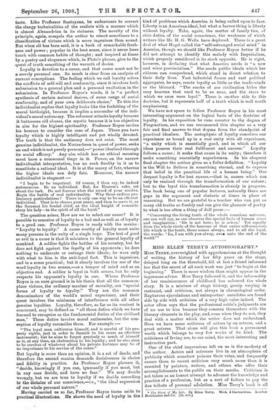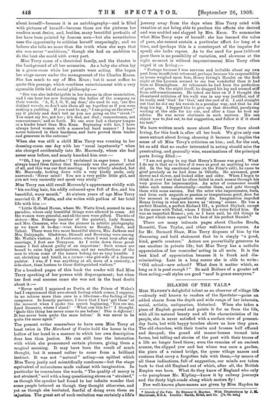MISS ELLEN TERRY'S AUTOBIOGRAPHY.* Miss TERRY, overweighted with apprehensions at
the thought of writing the history of her fifty years on the stage, delayed long on the threshold, till at last a friend informed her that the secret of all such work was just " to begin at the beginning." There is more wisdom than might appear in the ingenuous advice. Miss Terry followed it, and the informality of her reminiscences of childhood has coloured the whole story. It is a mixture of stage history, gossip varying in restraint, and criticism, not always in chronological order. Rapturous ejaculations and unimportant anecdotes are found side by side with criticism of a very high value indeed. The actor often says that the professional critic's judgments are of no use to him because they concern themselves with the literary elements in the play, and, even when they do not, they deal with a matter which the writer does not understand. Here we have some criticism of actors by an actress, and a great actress. That alone will give this book a permanent worth which belongs to very few works of its kind. The criticisms of Irving are, to our mind, the most interesting and instructive part.
One of the chief impressions left on us is the modesty of the author. Actors and actresses live in an atmosphere of publicity which somehow poisons their veins, and frequently causes them to resent criticism very much more than it is resented by painters, writers, and others who offer their accomplishments to the public on their merits. Criticism is not taken as an honest attempt to advance the knowledge and practice of a profession, but as a sort of failure to pay the due tribute of personal adulation. Miss Terry's book is all
* The Story of My Life. By Ellen Terry. With I liustrations, London Hutchinson and Co. [6s. net.]
about herself—because it is an autobiography—and is filled with pictures of herself—because those are the pictures her readers most desire, and, besides, many beautiful portraits of her have been painted by famous men—but she nevertheless uses the opportunity to criticise herself unsparingly; and we believe she tells no more than the truth when she says that she was never " ambitious," though she had an ambition to do the best she could with every part.
Miss Terry came of a theatrical family, and the theatre is the background of all her memories. As a baby she often lay in a green-room while her parents were acting. She began her stage career under the management of the Charles Keens. She has much to say of Mrs. Kean ; but it must suffice to quote this passage, which combines entertainment with a very agreeable little bit of social philosophy :—
" She was also indefatigable in her lessons in clear enunciation, and I can hear her now lecturing the ladies of the company on their vowels. A, E, I, 0, II, my dear,' she used to say, are five distinct vowels, so don't mix them all up together as if you were making a pudding. If you want to say, " I am going on the river," say it plainly and don't tell us you are going on the " rivah " You must say her, not har ; it's God, not Gud ; remonstrance, not remonstrance,' and So forth. No one ever had a sharper tongue or a kinder heart than Mrs. Kean. Beginning with her, I have always loved women with a somewhat hard manner ! I have never believed in their hardnewi, and have proved them tender and generous in the extreme."
When she was still a child Miss Terry was running to her dressing-room one day with her " usual impetuosity" when she charged accidentally into Mr. Macready, whom she had never seen before, and nearly knocked him over :— "Oh, I beg your pardon ! ' I exclaimed in eager tones. I had always beard from father that Macready was the greatest actor of all, and this was our first meeting. I was utterly abashed, but Mr. Macready, looking down with a very kindly smile, only answered: 'Never mind! You are a very polite little girl, and you act very earnestly and speak very nicely. '
Miss Terry can still recall Macready's appearance vividly with "his curling hair, his oddly coloured eyes full of fire, and his beautiful, wavy mouth." At sixteen years of age Miss Terry married G. F. Watts, and she writes with pathos of her brief life with him :—
"Little Holland House, where Mr. Watts lived, seemed to me a paradise, where only beautiful things were allowed to come. All the women were graceful, and all the men were gifted. The trio of sisters—Mrs. Prinsep (mother of the painter), Lady Somers, and Mrs. Cameron, who was the pioneer in artistic photography as we know it to-day—were known as Beauty, Dash, and Talent. There were two more beautiful sisters, Mrs. Jackson and Mrs. Dalrymple. Gladstone, Disraeli and Browning were among Mr. Watts's visitors. At Freshwater, where I went soon after my marriage, I first saw Tennyson. As I write down these great names I feel almost guilty of an imposture ! Such names are bound to raise high anticipations, and my recollections of the men to whom some of the names belong are so very humble. I sat, shrinking and timid, in a corner—the girl-wife of a famous painter. I was, if I was anything at all, more of a curiosity, a side-show, than hostess to these distinguished visitors."
For a hundred pages of this book the reader will find Miss Terry speaking of her powers with disparagement; but when her first real success came she was not in the least doubt about it :—
"Never until I appeared as Portia at the Prince of Wales's had I experienced that awe-struck feeling which comes, I suppose, to no actress more than once in a life-time—the feeling of the conqueror. In homely parlance, I knew that I had 'got them' at the moment when I spoke the speech beginning, You see me, Lord Bassanio, where I stand.' What can this be ? ' I thought. 'Quite this thing has never come to me before ! This is different 1 It has never been quite the same before.' It was never to be quite the same again."
The present writer remembers to have seen Miss Terry at least twice in The Merchant of Venice hold the house in the hollow of her hand in a manner to which her own description does less than justice. He can still hear the intonation with which she pronounced certain phrases, giving them a magical meaning. It may have been the result of much thought, but it seemed rather to come from a brilliant instinct. It was not " natural " acting—an epithet which Miss Terry justly and scientifically condemns—_but the stage equivalent of naturalness made radiant with imagination. In particular he remembers the words, " The quality of mercy is not strained," said with a long questioning stress on " strained," as though the speaker had found to her infinite wonder that some people behaved as though they thought otherwise, and yet• as though she hesitated, fearful of doing even them an injustice. The great art of• such recitation was certainly aide's journey away from the days when Miss Terry cried with vexation at not being able to produce the effects she desired and was scolded and slapped by Mrs. Kean. To summarise what Miss Terry says of herself : she has learned the value of pace, she cannot sustain a particular effect for long at a time, and (perhaps this is a counterpart of the impulse for speed) she lacks repose. As to the need for pace (without pace there is no possibility of variation, and slowness at the right moment is without impressiveness) Miss Terry often urged it on Irving:—
" Perhaps because I was nervous and irritable about my own part from insufficient rehearsal, perhaps because his responsibility as lessee weighed upon him, Henry Irving's Hamlet on the first night at the Lyceum seemed to me less wonderful than it had been at Birmingham. At rehearsals he had been the perfection of grace. On the night itself, he dragged his leg and seemed stiff from self-consciousness. He asked me later on if I thought the ill-natured criticism of his walk was in any way justified, and if he really said Gud ' for God,' and the rest of it. I said straight out that he did say his vowels in a peculiar way, and that he did drag his leg. I begged him to give up that dreadful, paralysing waiting at the side for his cue, and after a time he took my advice. He was never obstinate in such matters. His one object was to find out, to test suggestion, and follow it if it stood his test."
We have written much more about Miss Terry than about Irving, for this book is after all her book. We give only one more extract about Irving, choosing it because it implies the sense of all Miss Terry's criticism on him ; and, for the rest, let us add that no reader interested in acting should miss the penetrating, and generally wise, examinations of the principal parts Irving filled :— " I am not going to say that Henry's Romeo was good. What I do say is that some bits of it were as good as anything he ever did. In the big emotional scene (in the Friar's cell), he came to grief precisely as he had done in Othello. He screamed, grew slower and slower, and looked older and older. When I begin to think it over I see that he often failed in such scenes through his very genius for impersonation. An actor of commoner mould takes such scenes rhetorically—recites them, and gets through them with some success. But the actor who impersonates, feels, and lives such anguish or passion or tempestuous grief, does for the moment in imagination nearly die. Imagination impeded Henry Irving in what are known as`strong'. scenes. He was a perfect Hamlet, a perfect Richard III., a perfect Shylock, except in the scene with Tubal, where I think his voice failed him. He was an imperfect Romeo ; yet, as I have said, he did things in the part which were equal to the best of his perfect Hamlet."
There are many intimate pages about Charles Reade, Rossetti, Toni Taylor, and other well-known persons. As for Mr. Bernard Shaw, Miss Terry disposes of him by the disarming and bold statement that he is simply "a good, kind, gentle creature." Actors are proverbially generous to one another in private life; but Miss Terry has a catholic appreciation of her comrades' acting in all sorts. It is the best kind of appreciation because it is frank and dis- criminating. Late in a long career she is able to write : " Old school—new school P What does it matter which, so long as it is good enough ?" So said Boileau of a greater art than acting,—all styles are good "sauf he genre ennuyeux."











































 Previous page
Previous page